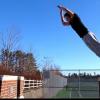Search the Community
Showing results for tags 'determined practice skill'.
-
So I recently read a thread where several people seemed to disagree on a technicality - practice versus strength and technique, particularly as it applies to handstand training (it's a locked topic, but I felt like I needed to reply anyway. Here's the original link: https://www.gymnasticbodies.com/forum/topic/8562-losing-sanity-over-handstands/) I've read many books about psychology, neuroscience, and developing skill progressions in different areas. Some of these books analyzed people that were at the top of their respective skills (violin, chess, sports...) (if you want a really good book that I'm implicitly borrowing these ideas from, try Malcolm Gladwell's Outliers). The key concept in these books was that the people who were the best at (insert activity here) were not necessarily practicing more than everyone else, but they spent more time working on their weaknesses. So while practice is necessary for the acquisition of any skill, what is even more important and what the best among us posess, is the ability to practice specifically the areas we are lacking in. A lot of the time, this sort of practice is not fun - it's a lot more fun to work on our strengths than on our weaknesses. But that is the key to progress - identifying your weakest link and making it stronger (for example, top guitarist spend / have spent a lot of time doing drills that are uncomfortable but promote finger dexterity, which allows them the capability to be more versatile in their playing style than an average guitarist). This is also why Foundation 1 appears to be an effective training course (and a downfall of a lot of do-it-yourself lifting programs, which usually let you focus on your "strong areas" rather than your weaknesses) Foundation 1 focuses on training specifically the areas that are lacking in your neuromuscular development - it is that determined practicing of your weaknesses, so to speak, that will make you better. Ideally, people would apply this to every skill they wanted to master - I have recently taken up juggling for example. The best way to learn to juggle is not to try and do X number of balls right away. The best (and fastest) way to learn is to go through repetitive drills that train specifically the parts of juggling which you find the hardest (for example consistent throws with your left hand). After that deficiency is fixed, the goal becomes much easier to achieve overall. This has become a bit of a rambling post, so I will leave you with an inspirational video about determined practicing, featuring none other than Jordyn Weiber: Edit: color for emphasis



